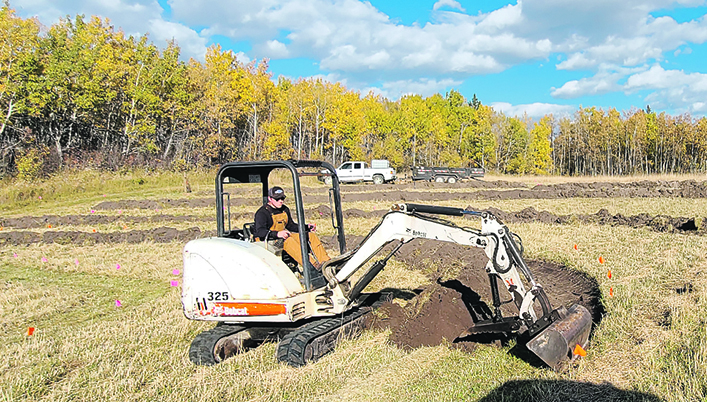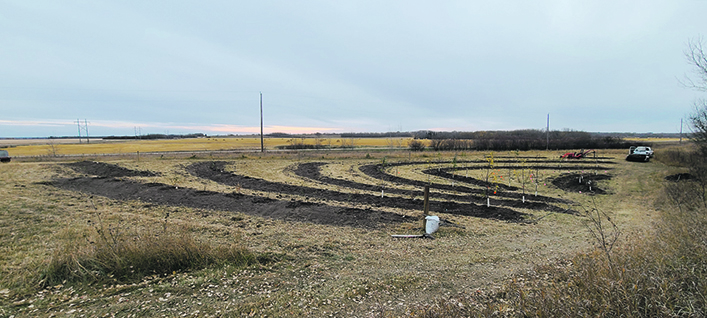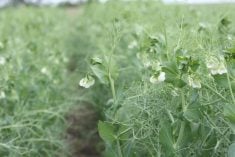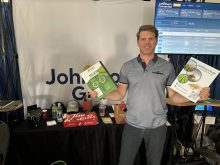One of Slade Doyle’s biggest priorities on his 240-acre hobby farm is sustainability.
While Doyle has learned about many different sustainable practices, the one that spoke to him the most was permaculture.
“I became a champion for soil health, and of course, that led me down to the roads of regenerative agriculture and then permaculture,” Doyle says.
Read Also

Farmers urged to be grain-safe this fall
Working around grain bins comes with risk, from farmers falling to drowning in grain: Experts have five tips to help avoid grain-related accidents this harvest.
“Permaculture is kind of like recreating that natural system, but obviously playing with it.”
Doyle’s land, known as Heartleaf Farm, is located near Onanole, Man., within the Riding Mountain National Park biosphere. He considers himself a hobby farmer, but the work he does on his hobby farm is what he is passionate about.
The land was previously used for crop production, but since Doyle purchased it 11 years ago, he has converted it into pasture for his chickens, pigs and some custom grazing he does. He also has bees and a large garden.
His interest in permaculture started years ago when he was having health issues and did not find solutions from the medical system. So, he decided to deal with the problem himself and change the way he ate.

“Kind of was left with a situation where if I didn’t figure out how to help myself, there was no answers out there in the medical community to help me,” Doyle says.
“So, I started learning about food and where our food comes from.”
His journey with food started with eggs, where he purchased his own laying hens to have access to farm-fresh eggs. From there, he began to compost for his garden, obtained worms and began to raise livestock for consumption.
“It gave me a passion to understand that food was the reason that maybe I wasn’t well. And that’s kind of how it started for me, and what I learned about our real food system actually was quite scary,” he says.
His hobby farm hasn’t just helped his physical health but also his mental well-being.
Decades ago, at age 21, Doyle lost both his hands in a high-voltage accident while working with Manitoba Hydro and now wears prosthetics. He says once he found his passion in permaculture, soil health and healthy food, his sense of purpose was reignited, and it helps him get out of bed every morning. Now, he throws his energy and focus into that passion.
Permaculture is a form of regenerative management that aims to create agricultural design principles that copy what is seen in nature to ensure ecosystems are sustainable and self-sufficient.
Doyle says in many ways, permaculture is not so different from practices such as holistic management.
“It really grabbed my attention because my background is engineering and with it was just that whole idea of actually working with nature instead of always fighting nature, and working with nature and real food is how I healed myself,” he says.
Working with his neighbours at Northam Farm, Doyle is expanding his work in permaculture by creating a food forest that connects both of their lands. This means planting a variety of fruit trees on land that is probably not suitable for much else to improve the soil and help with food security.
The food forest is built on swales Doyle has dug into the contours of a hill and comprises fruit such as apples, cherries and saskatoons.
“It helps stop the water and keep it on the land and allows the water to stay here,” he says.
“At the same time, with the contour swales and with the food forest it allows the slowdown of water … and then to help feed those trees in the swale. So when it’s raining, they’re not just getting the water that’s falling around it, they’re getting all the water that is above them that would normally just rush down the hill.”
The Northams have a cattle ranch near Rapid City, Man., as well as pigs, chickens and around 2,000 acres of cropland. The farm is multigenerational, comprising Karen and Doug Northam and their children, Dan Northam and Crystal Johnston.
In a Facebook message, Johnston says they have always been interested in regenerative agriculture on their operation.
“We have always done things a little different over here, starting with being organic. We are always learning and feel that having Mother Nature on our team was one more tool we could add to the toolbox. When you come from a family that’s willing to try new things, it’s easy to branch out.”
When Doug heard about the work Doyle was doing with permaculture, they got together and the idea for the food forest started. As it becomes a reality, the Northams hope to create a sustainable producing orchard to benefit them and the generations that will follow.

“We currently have three generations living on this land and a fourth spending all the time they can here. So, conversations about farming for the next generation are super important to us.”
The food forest is being fenced off so their livestock can’t access it and it can be used for human consumption. However, Doyle says he wants to bring his chickens through the area in the fall to consume some of the fruit that will have fallen off the trees.
He says the goal is to create a cyclical system.
“It’s just kind of going through and trying to create systems that are a closed loop where I don’t really have to do too much other than just kind of manage and massage it as it’s growing, so to speak,” Doyle says.
“At the end of the day, it’s trying to work smarter, not harder.”
Nearing close to 15 years as a hobby farmer, Doyle doesn’t have any plans other than to keep enhancing the food he and his family consume and to nurture his passion and purpose with more permaculture methods.
“I just want to apply these principles and create my own oasis here and create food security. So, basically, I’m kind of doing everything I want to do right now.”
















